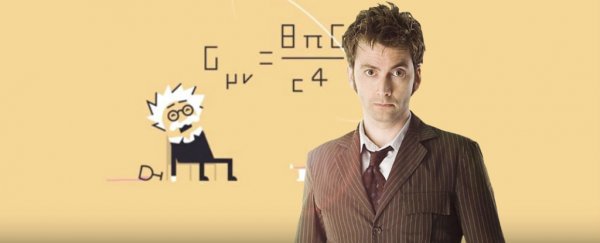On 14 March 2017, the world celebrated what would have been Albert Einstein's 138th birthday. But while all of us know and love the revolutionary physicist by name, how many of us actually understand his work well enough to explain it over the dinner table?
If the thought of that makes you break out in a cold sweat, don't worry, because David Tennant, Doctor Who's 10th Doctor, is here to explain it for you in his delightful Scottish accent, and the whole thing suddenly makes so much more sense.
After all, who better than someone who played a time lord to break down the complexities of space-time and general relativity (you know, all that wibbly wobbly time-y wimey stuff)?
This video was created back in 2015 for the UK's Science and Technology Facilities Council to celebrate the 100th anniversary of Einstein conceiving his world-changing theory of general relativity, and it's just as awesome today:
As Tennant so eloquently lays out, at the enviably young age of 26, Einstein came up with a new theory that simplified physics by essentially treating space and time as one thing… the appropriately named space-time.
But that was just the beginning. Over the next 10 years he also decided to take on Isaac Newton's explanation of the mysterious force of gravity, and came up with his own theory for that too.
In a very simplified nutshell, Einstein's theory of general relativity is this: mass causes space-time to curve.
That might sound pretty basic, but if you can get your head around that, it can explain a lot of the other phenomena we see in the Universe.
Take gravity, for example. The natural motion of things is to follow the simplest path through space-time - but since massive objects curve that space-time, stuff tends to move towards those objects, which is what we feel as gravity.
While warped space might sound like it something out of sci-fi, Tennant explains that scientists have actually been able to measure the bending of starlight as it passes through the warped space around our Sun.
And warped time might sound even more ridiculous, but we've shown that when you take an accurate clock to the top of a very tall building, it runs every so slightly faster than when it's on the ground.
As you move away from the centre of our planet, space and time become less warped, which is one of the reasons it's so hard for us to make it out into space.
Perhaps most impressive of all, though, is that Einstein's theory of general relativity told us that the Universe had a beginning - that everything we see today is expanding out from a hot, dense origin around 13.8 billion years ago.
For more than a century now, Einstein's theory of general relativity has stood up to every test possible. But that might not always be the case - there are a few gaps left to be filled.
Importantly, scientists have found evidence that the Universe is expanding faster than Einstein's theory ever predicted.
To explain that, they've proposed the concepts of dark energy and dark matter - exotic forms of energy and matter that should make up around 95 percent of the Universe.
But we've never actually detected either of them, which is the kind of thing that keeps physicists up at night.
Scientists are now developing more impressive tools so they can continue to test Einstein's theory in more advanced ways than ever before.
Whether it continues to pass all these tests with flying colours, or eventually fails, physicists will still have cause to celebrate, because what we're constantly trying to get closer to is the truth of how our Universe functions.
Check out the video above to fully appreciate just how awesome that is.
H/t: Nerdist
